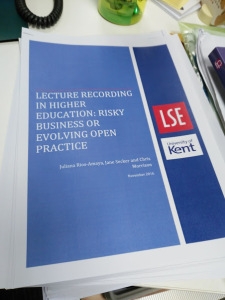Lecture recording is an optional service available in many of the School’s classrooms. However, it’s a topic that sometimes causes concerns among staff about issues relating to copyright and intellectual property. I’ve been interested in this topic for some time and written guidance for staff at LSE about using the service. However, in September Chris Morrison from the University of Kent and I presented the interim findings from the lecture recording survey at the ALT-C conference, which was carried out earlier this year to investigate copyright and IP policies at 33 higher education institutions. The research was carried out to better understand the different universities policies relating to copyright and intellectual property. Some of the issues we explored included: obtaining consent from lecturers, the ownership of the resulting recorded lecture, how third party copyright (such as images or charts) was handled in recorded lectures and the levels of copyright advice and support available to lecturers.
Thirty three institutions from a good range of Russell Group, post-92 and other universities responded to the survey. We followed up the survey with a policy analysis based on 11 documents collected from a sub-set of the respondents.
 The report is finally now available and LTI are grateful to Juliana Rios-Amaya who was a research assistant with us over the summer and worked hard on the analysis and drafting of the report. Thanks to everyone who helped make this research possible including: Philippa Hatch (Imperial College), Alex Fenlon (University of Birmingham), Charlotte Booth (University of Reading), Carol Summerside (Newcastle University), Helen Cargill (Kings College London), Phil Ansell (Newcastle University) and Scott McGowan (Keele University) who helped devise the survey. Also thanks for John X Kelly, Lizzie Gadd and Ronan Deazley for commenting on earlier drafts.
The report is finally now available and LTI are grateful to Juliana Rios-Amaya who was a research assistant with us over the summer and worked hard on the analysis and drafting of the report. Thanks to everyone who helped make this research possible including: Philippa Hatch (Imperial College), Alex Fenlon (University of Birmingham), Charlotte Booth (University of Reading), Carol Summerside (Newcastle University), Helen Cargill (Kings College London), Phil Ansell (Newcastle University) and Scott McGowan (Keele University) who helped devise the survey. Also thanks for John X Kelly, Lizzie Gadd and Ronan Deazley for commenting on earlier drafts.
Rios-Amaya, J., Secker, J. and Morrison, C. (2016) Lecture recording in higher education: risky business or evolving open practice. LSE / University of Kent. [PDF]
Executive Summary:
Reports on a survey into the copyright and intellectual property (IPR) policies of UK higher education institutions with regards to lecture recording. The practice of using institutional semi-automated lecture recording systems is becoming mainstream with 71% of institutions reporting using it in 2016 (UCISA, 2016). However, these systems raise a number of issues related to copyright and IPR that in some cases are documented in specific policy documents. Issues that arise include the consent that is obtained from academic staff, the ownership of the resulting outputs and responsibility and advice given for the use of third party content in the lectures. These issues are also often linked to, or conflated with wider ethical issues such as identity, privacy and academic freedom. The findings from the survey are presented alongside a policy analysis of IPR documents and policies from 11 institutions. These are compared to the guidance provided by Jisc (2015). The findings from the survey reveal that most institutions are still developing their IPR policy with regards to lecture recording, that many institutions seek consent from lecturers, but there is an increasing move towards making lecture recording opt-out as opposed to opt-in. The survey revealed in 94% of cases the lecturers or presenter is responsible for any third party content contained within their lecture and while institutions do offer advice about dealing with third party content, much of it is delivered in a relatively passive way, through agreeing to use the system or by information made available online in guides. The findings from the policy analysis suggest that those institutions with a high level of institutional control tend to have a higher level of comprehensiveness of approach towards lecture recording. Additionally the institutions that provide a higher level of support for copyright advice, have a tendency towards open practice and higher levels of appetite for risk. Good practice advice for institutions and recommendations for further research are presented as part of this study.







[…] Lecture recording in UK Higher Education: results from a survey […]